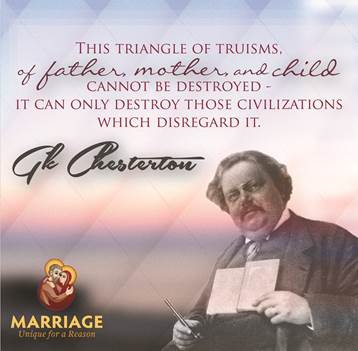 Complementarity in Philosophy and Social Commentary
Complementarity in Philosophy and Social Commentary
This post is by no means exhaustive, or even representative, of all the thinking about male-female complementarity that has been done in the field of philosophy. It is simply a sample of ideas on the topic that may prove helpful.
Aristotle (384-322 BC) talks about complementarity in terms of the division of labor in the family. He writes about the friendship of husband and wife in Nicomachean Ethics (Book VIII, Chapter xii). Noting that the home is “prior and more necessary” than the political world, Aristotle asserts that work is divided between the two in order to provide for one another. He also argues that children, the common good of the couple, are what bind them together. Aquinas (1225-1274) points out that man and woman united in marriage are meant to be educators for their children, not only procreators (Question XLIX, second article).
Social commentator G.K. Chesterton (1874-1936) wrote an essay entitled “The Equality of Sexlessness” in which he joked that, “When all are sexless, there will be equality. There will be no women and no men. There will be but fraternity, free and equal. The only consoling thought it that it will endure but for one generation.”[i] In his writing, he continually affirms the importance of domestic life for all of society, since it shapes the future generations, and he points out that children “require to be taught not so much anything as everything.”[ii] This, he says, is why women are such incredible multi-taskers and “janes of all trades.”
Christian theologian Gilbert Meilaender (b. 1946) penned an essay on male-female friendship arguing that friendship between persons of different sexes is always qualitatively different from same-sex friendship. Basing some of his reflections on the aforementioned Nicomachean Ethics, Meilaender says that friends enjoy sharing in activities together, knowing that another person likes the same things they like. “The friend must be ‘another,’” he writes, “but not entirely ‘an-other,’” as with someone of the opposite sex. They understand each other differently. This is observable through common experience. “I know exactly how you feel,” is more likely to be said truly to someone of the same sex. Meilaender postulates that conversation always changes, even if the topic does not, when a person of the opposite sex joins in. (This is supported by the popular book genre that promises to help readers interpret the other sex’s speech, such as You Just Don’t Understand: Women and Men in Conversation). Miscommunication between the sexes is also a ripe field for the scope of comedy, as seen in this fictional conversation by Dave Barry.
There seems to be general agreement in the world today that there are differences between the sexes, and that they are a result of both nature and nurture; there’s disagreement mostly about how different, and what those differences may imply. Next week we will go a little deeper into the possible meaning behind these differences.
[i] G.K. Chesterton, “The Equality of Sexlessness,” Brave New Family (San Francisco: Ignatius Press, 1990) p. 101.
[ii] G.K. Chesterton, “The Emancipation of Domesticity,” Brave New Family, p. 112.
Leave a Reply